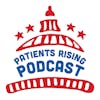March-In Mayhem 🥾

Last week, the White House announced it has plans to use the government’s “March-in” rights on drugs developed with public funding. This week, we’re joined by our very own Executive Director here at Patients Rising, MacKay Jimeson. He...
Last week, the White House announced it has plans to use the government’s “March-in” rights on drugs developed with public funding.
This week, we’re joined by our very own Executive Director here at Patients Rising, MacKay Jimeson. He explains why he and other experts believe this will not lower what patients pay at the counter for prescriptions, and actually could do much more damage by discouraging new treatment development, particularly for the rare disease patient community.
We also talk about the FDA approval of a powerful new tool that will treat sickle cell disease.
Need help?
The successful patient is one who can get what they need when they need it. We all know insurance slows us down, so why not take matters into your own hands? Our Navigator is an online tool that allows you to search a massive network of health-related resources using your zip code so you get local results. Get proactive and become a more successful patient right now at the Patients Rising Helpline.
Have a question or comment about the show, or want to suggest a show topic or share your story as a patient correspondent?
Drop us a line: podcast@patientsrising.org
The views and opinions expressed herein are those of the guest(s)/ author(s) and do not reflect the official policy or position of Patients Rising, nor do the views and opinions stated on this show reflect the opinions of a guest’s current or previous employers.
MacKay Jimeson 0:03
Using the government's march-in rights to invalidate patents when they don't like the pricing policy of a particular medicine. This is a pretty radical departure from what has been the norm.
Terry Wilcox 0:14
This week on the patient's rising podcast, some drastic steps from the White House to curb drug prices. But we are confident they're going about it in a way that won't help prices and actually could hurt patients in the long run. MacKay Jimeson, the Executive Director of Patients Rising, joins us to discuss march-in rights and what they mean for you and your access to new medicines. Welcome to the Patients Rising Podcast. I'm your host, Terry Wilcox, CEO of Patients Rising. I'm joined by my co host, who has come up with a joke combining Hanukkah and medical innovation. He's Bob Goldberg, co founder of the Center for Medicine in the Public Interest. Okay, Bob? Well, first of all, I hope you had a happy Hanukkah. We had a grand celebration here the other night with our friends and my mother in law. So it was it was great. How was yours?
Bob Goldberg 1:03
Good. But I'm still dizzy from playing dreidel with my grandkids. So I'm a little off more off balance than usual. That's the reason.
Terry Wilcox 1:13
Now, what's the joke? This better be good.
Bob Goldberg 1:15
All right, it is good. All right.
Terry Wilcox 1:17
Okay.
Bob Goldberg 1:17
How do you know a latka (everyone knows Latka the potato pancake) A latka is produced using gene therapy?
Terry Wilcox 1:27
I don't know, Bob, how do you know a lot kit is produced using gene therapy?
Bob Goldberg 1:32
When it's CRISPR. Get it? CRISPR. You know, like the technology?
Terry Wilcox 1:41
Yeah, I get it.
Bob Goldberg 1:42
Yeah, not bad. I patented that joke, by the way.
Terry Wilcox 1:47
Bob, I wouldn't worry about the federal government marching in to take away your IP on that one. Which is some kind of transition to our discussion today about march-in rights. Can you tell us a little bit about that before we hear from MacKay?
Bob Goldberg 2:02
Right, march-in rights came into existence in 1980 as part of the Buy Dole Act, which was designed to take all the IP that was being produced in federal labs, and instead of keeping it on the shelves, commercializing it. And the goal was to give the IP away to allow companies to add additional resources and research to develop and it cuts across NIH Department of Energy DOD. Now march-in rights were intended to be used when the products were not going to be put to the market for public use. In other words, if a company was developing a product, and it was only if they weren't going to market it, then the government would have a right if they saw a value in it for promoting public health to come in and say, Okay, listen, we're going to reassign the rights back to us. And then we're going to manufacture or find someone to manufacture it. But the way the White House wants to use it is really a distortion with a big difference.
Terry Wilcox 3:08
Well, and as with so many things we talk about, Bob the original intention was pretty good. But over the years, it has gotten twisted.
MacKay Jimeson 3:16
The idea behind march-in rights is really to solve some kind of problem that may occur with the production of some of these patent protected technologies from government funded research. So an example of that would be, let's say, a hurricane took out a manufacturing plant, and the manufacturer of that particular product was unable to continue to deliver that to Americans, and it was very much in the public interest. The government would then use the march-in rights to allow others to manufacture that particular product to make sure that the supply was continued to be available for patients.
Bob Goldberg 3:52
What exactly is the White House doing with these marchin rights? Well, here's what McKay has found out.
MacKay Jimeson 3:59
It sounds hostile, but it was it's actually, in most cases intended to be really something a tool to help maintain sort of supply or make sure that Americans continue to have access to these important technologies, these important inventions that occur. What has changed now, with this recent announcement from the Department of Commerce is they have taken a far more hostile approach and specifically have targeted, patent protected medicines that may be based on some form of NIH funding. And basically, this update calls out drug pricing specifically, they don't give a lot of specifics in terms of what that level of cost is was sort of an unacceptable cost. But effectively, what they said is, if a discovery has had some form of taxpayer funding from the NIH, and the government disagrees with the pricing policy, they can use those march-in rights to allow other manufacturers to come in and effectively genericized a patent protected medicine.
Terry Wilcox 4:59
Now MacKay says using march-in rights in this way goes against one of the few things that actually is right with our system.
MacKay Jimeson 5:07
The one thing that's really worked in our healthcare system is American ingenuity and inventiveness. We lead the world in advancing science, medicine, and technology, and that has directly benefited from our healthcare system. Now, that doesn't mean that patients shouldn't have access to affordable medicines. But that's actually not a function of a patent, that is a function of failures of our insurance model. And the insurance companies in their pharmacy benefit companies that are creating predatory formulary practices are using perverse financial incentives in a way that actually disadvantages those patients who are most in need of basically the best in class medicine available to them.
Terry Wilcox 5:48
Now, Bob, isn't it ironic, the one thing that is working and they somehow they've misconstrued this, to make it seem like this could actually lower drug prices? It's so far afield to me. What are your thoughts?
Bob Goldberg 6:04
Well, you know, they're punishing success. But they're telling everybody if you partner with a academic researcher, that gets NIH funding, or you partner with the NIH to develop a medicine that could come under review by the Department of Commerce and through the NIH say, well, we think the price is too high, you better lower it, otherwise, you're going to take your patent. There will be no investment in NIH research.
Terry Wilcox 6:32
Now, I mean, this is one of the dumbest, because if you actually ask people at the NIH, or people who are receiving NIH funding for research at universities or, you know, medical institutions, etc, they will flat out tell you, they're not for this. I mean, they won't come on publicly say it for whatever reason.
Bob Goldberg 6:52
Well, they will they do, though, I mean, look, back in the day, the Clinton administration tried this in 1994, as part of their efforts to lower drug prices. And not only is this government overreach, but you know, it's extortion, it's bullying.
MacKay Jimeson 7:08
It's a bullying tactic against, you know, inventors of new medicine, the biopharmaceutical industry, life science companies, those that are investing in new treatments and cures to basically say, we expect you to price medicines, the way that we like it, not based off of what the value that patients see, as relates to those treatments.
Terry Wilcox 7:28
Now, what we need to be doing is focusing on the issues at the heart of the problem. And guess what, Bob, those issues aren't anything to do with competition.
MacKay Jimeson 7:36
Really, I think we need to be trying to address what the actual problems that are creating unaffordability and creating access issues for patients. And again, that really starts with the way that we are reimbursing healthcare. And that starts really, with how insurance companies are really focused on profiteering from those that are most vulnerable, most in need of, you know, the best medicine available. If we were to restart the system, we would start with the patient. And we would say what is in their best interest in the long term. Instead, we're focused on a model that looks at a calendar year and trying to manage costs as cheaply as possible through the course of that calendar year. It's just not simply in the interest of the patient. And so what we need to do is sit here and say we have incredible advances in science, medicine and technology that people need.
Bob Goldberg 8:22
Well, it's not solving the problem. It's just causing a different one.
MacKay Jimeson 8:27
It certainly is another way of eroding. Really what has been working in terms of creating new medicines, this will temper investment. This will create a new level of risk if you're an investor in terms of if we invest in a certain technology, are we at risk of actually not receiving the benefit from that multimillion dollar billion dollar investment that we're putting into a new treatment?
Bob Goldberg 8:51
Listen to Terry, combined with the price negotiations of the inflation Reduction Act, this...
Terry Wilcox 8:59
This is a lot of government intervention.
Bob Goldberg 9:01
Yeah.
Terry Wilcox 9:02
You know, Pfizer and J&J and Novartis and GSK, and on and on, they're all going to retool and you know, figure out how to navigate this new normal, but what's not going to be happening is the research at that venture capital level. And that's those are the tweets that people aren't putting out. Because that's where the reality lies of what's happening. And the same thing could happen here. You know, if you're not going to protect the patent, what's the point? That patent is all you have.
Bob Goldberg 9:36
That's it!
Terry Wilcox 9:37
That's your whole, your value is in the patent?
Bob Goldberg 9:41
Yeah. And you know, you work off the patent to protect the processes and methods that you're using to develop a drug. You know, we now have two cures on the market for sickle cell anemia. Now, who in the right mind would invest in this kind of technology which is truly revolutionary. If anytime you did business with a an academic center that got NIH funding or NIH itself, and said, Well, you know, if you come up with this cure, you know, we're going to impose a price control on it, you're not going to invest in that.
Terry Wilcox 10:18
We're also dealing with such ambiguities here. I mean, this framework "haha" framework put out. It doesn't even define what justifies an intervention.
MacKay Jimeson 10:29
And it's going to be important that people stand up and ask questions about when you say the price is too high for a medicine, what does that really mean? Because it's not very specific in that guidance. And so it seems very subject to interpretation based on who's in charge on what that could mean. And so, how big of a threat is this really? No one can answer that question because the guidance that's being offered is not specific enough. And so it's in everybody's interest, I think, to have very clear definitions on what they're actually talking about when it relates to march-in rights for prescription drugs. Because if we're starting to tinker with what works and creating medicines, patients will lose.
Terry Wilcox 11:11
Well, Bob, I definitely think this whole thing is far from over. Companies are going to push back on this, obviously.
Bob Goldberg 11:19
Patients will too.
Terry Wilcox 11:21
Well, I can't stress enough how little patents have to do with drug pricing. Not only do they not have little to do with it, they have nothing to do with it.
Bob Goldberg 11:30
This has been tried twice. It's failed twice. It's had negative effects twice. Not only will it hurt, innovation, but why would venture backed startup companies that partner with academic institutions that need the billions of dollars that the private investment community can put in, all those partnerships will dry up, all the academic research centers will have stuff sitting on the shelves half baked.
Terry Wilcox 12:01
And trust me, everyone out there, Patients Rising absolutely agrees that drug prices and affordability and access for patients it needs to be fixed in certain areas. I want to make that very clear. We just don't think this is how it's done. By taking patents and marching off with them.
Bob Goldberg 12:21
We have a link to an episode of the Healthcare Policy Pop, where MacKay spend some more time discussing march-in rights and we'll put that link up along with other resources to inform you about what march-in rights can do and what damage can be done in the show notes.
Terry Wilcox 12:44
This episode of the Patients Rising Podcast is brought to you by the Patient Helpline. Do you have questions about medical transportation or health insurance? What about caregiving? the Patient Helpline is a free service here to answer all of these questions and more. Call or email us and one of our trusted navigators will be there to help. These navigators have handled countless issues for patients and caregivers just like you. If you or someone you know has a healthcare question, challenge, or issue, we're standing by and ready to help to get in touch, leave us a voicemail, or send us an email using the link in the show notes.
Bob Goldberg 13:22
Well, before we go today, let's talk about some other stories in the news that patients should be interested in.
Terry Wilcox 13:29
Well, Bob, I actually wanted to start with you. Because you, as you mentioned earlier, penned a recent op ed, all about what McKay was just talking about, right?
Bob Goldberg 13:40
Right, and co authored with Frank Douglas. And the reason that it's a great article is not because I wrote it, but because Frank started out doing worldwide drug development for major pharmaceutical company, transitioned to academic research to set up biomedical innovation centers in two universities. And then it was on the board of the National Center for Advancing Translational Science at NIH. So he's seen the impact of march-in rights across the board. And the article really sort of discusses from his perspective what happened. It really backs up everything that McKay said.
Terry Wilcox 14:19
We're gonna link to it in the show notes. And I hope everyone who's listening takes a minute to go read that because it does really, you and Frank really do lay it out nicely. And explain it well. So I hope everyone reads it. Now finally today let's end with a little bit of good news. Bob, we joked about in the beginning.
Bob Goldberg 14:39
Just about CRISPR, I know.
Terry Wilcox 14:40
The first treatment to use the gene editing tool CRISPR has been FDA approved. For sickle cell disease.
Bob Goldberg 14:50
Yes. Well, CRISPR is short for (I'm glad that it's short for something) Clustered Regularly Interspaced Short Palindromic Repeats. So, again, what it is I said at the outset, it allows scientists to focus in on DNA and take it out and fix it and put it back in and see how it functions. So CRISPR can basically take out a faulty engine in your cellular reproductive system, repair the engine, put it back in, and that engine will start running smoothly and start producing healthy cells. What they've done with sickle cell anemia is remarkable.
Terry Wilcox 15:33
Well, this is hugely significant. Now we can't leave out because everybody else isn't gonna leave it out. Because it is, it is a big price tag, which is $2.2 million per patient. But Bob, isn't this part of the promise of patents? The things that we talked about. This is the promise of all those things we've been talking about. First of all, it's expensive, because it is curative. We may learn other things over time, but this is kind of one and done, correct?
Bob Goldberg 16:02
Yeah. I mean, and that's the promise. And you know even if you're just looking at stuff from a budget perspective, it's a cost saver. But in terms of giving patients life back, if you read some of the stories about people saying that they are living pain free for the first time ever.
Terry Wilcox 16:21
It is amazing. I'm so happy for the sickle cell community. I mean, they've waited a long time for this and to be I have so many painfree, I know that's one of the biggest side effects.
Bob Goldberg 16:33
Well, that's all for today. We will have another episode next Monday. And that means you should follow us on your favorite podcast player so you can be notified as soon as the new episode is live. Plus, stick with us through the new year because we have a lot of great resources coming your way.
Until next week from Bob and everyone at Patients Rising. I'm Terry Wilcox, stay healthy.










